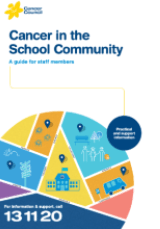- Home
- About Cancer
- Schools and teachers
- Cancer in the school community
- Talking about cancer in schools
- Respecting privacy
Respecting privacy
Some people wish to keep their cancer diagnosis private. There can be a number of reasons for this:
- Students may see school as a place to be themselves and carry on with life as normal. Because fitting in with peers can be so important, they may want to minimise anything that makes them seem different.
- Parents or family members may want to avoid gossip or probing questions. Sometimes they need more time to talk to relatives or decide on treatment.
- A colleague with cancer may want to continue working and focus on their day-to-day activities, or they may wish to keep their diagnosis private until they know how it will affect their work schedule.
- Some teachers worry that their students are too young to understand cancer.
The importance of consent
These are legitimate concerns, and people’s rights should be respected. Unless there are overriding health and safety issues, the person with cancer or their parent must give consent before anyone is told about the diagnosis.
In most cases, however, it will be easier for both the person with cancer and the school if at least key staff are aware of the diagnosis.
An informed teacher can:
- accommodate the person’s needs
- anticipate questions from students, colleagues or families
- help to distribute information (if consent has been given).
Have open conversations
The reality is that even very young students have heard of cancer. Open and honest conversation about cancer reduces the risk of confusion and anxiety and helps children of all ages understand.
Being open about the diagnosis can also reduce the chance of gossip and misinformation circulating around the school community, particularly if treatment leads to changes in someone’s appearance (e.g. hair loss, amputation).
Keep personal information private
Any member of the school community who is provided with personal information about a student, student’s family or staff member, needs to treat the information sensitively and confidentially.
I didn’t want to share my diagnosis with everyone. Mum and I are both really private. I didn’t want people to treat me differently.
– Read more of Emma’s story
→ READ MORE: Appointing a school liaison person
Podcast: Explaining Cancer to Kids
Listen to more episodes from our podcast for people affected by cancer
More resources
Claire Tobin, Principal Medical Advisor, Department of Education and Training, VIC; Dr Antoinette Anazodo, Paediatric and Adolescent Oncologist, Sydney Children’s Hospital and Prince of Wales Hospital, Director of The Sydney Youth Cancer Service, and Conjoint Senior Researcher, University of New South Wales, NSW; Lisa Barrow, Clinical Nurse Educator, Children’s Cancer Centre, Royal Children’s Hospital, Melbourne, VIC; Margo Bulic, Psychosocial Support Worker, CanTeen, ACT; Amber Copeland, 13 11 20 Consultant, Cancer Council Queensland; Donna Drew, Clinical Nurse Consultant, Paediatric Oncology/Palliative Care, Kids Cancer Centre, Sydney Children’s Hospital, Randwick, NSW; Allesha Fecondo, Education Consultant, Victorian Paediatric Rehabilitation Service, and Education Liaison, Ronald McDonald Learning Program, Ronald McDonald House Charities Australia, VIC; John Friedsam, General Manager of Divisions, CanTeen Australia, NSW; Pina Hutcheson, President, Catholic Primary Principals’ Association of WA; Cara Irvine, Year 8 Coordinator, Alfred Deakin High School, ACT; Andrew Long, Assistant Director, Policy and Research, Independent Schools Council of Australia, ACT; Dr Alistair Lum, Post-doctoral Research Fellow – Behavioural Sciences Unit, Sydney Children’s Hospital, University of New South Wales, NSW; Kristine Luszczynski, Learning Program Manager, Quality and Standards, Ronald McDonald House Charities Australia, NSW; Anita Neville, National Manager, Ronald McDonald Learning Program, Ronald McDonald House Charities Australia, VIC; NSW Department of Education, NSW; Mandy Roney, Consumer; Shannon Rush, Primary School Program Manager, Camp Quality, SA; Luke Wade, Education and Career Support Consultant, Redkite, QLD.
View the Cancer Council NSW editorial policy.
View all publications or call 13 11 20 for free printed copies.

